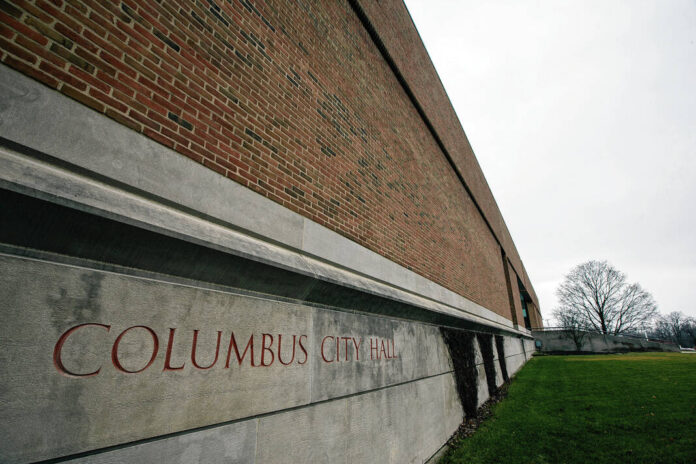It’s official: Columbus will become a “second class” city in 2024.
Columbus City Council voted Tuesday to approve the second reading of an ordinance making the change. The vote was 5-1, with Councilman Frank Miller, R-District 4, opposing the measure. Councilman Jerone Wood was absent.
The change to second class entails certain changes to city structure, including the addition of two more city council members.
Miller was the sole vote against both readings of the ordinance and has previously expressed concern about the costs that such a change might entail. He also noted that while the city’s current administration does not plan to make some of the optional, departmental changes that are allowed for second class cites, future leaders may make a different decision.
Other council members see the move to second class status as a way to provide better representation for residents, obtain additional help with complex financial matters and foster more collaboration between city officials through checks and balances.
One resident, James Howley, spoke up during the time for public comment to oppose the change.
“I feel like any vote for this, by the city council, is not a vote to represent the residents, but instead a vote in service of the government,” he said at Tuesday’s meeting.
Under the approved legislation, Columbus will officially become a second class city on Jan. 1, 2024. At present, Columbus is a “third class” city.
Under Indiana Code, municipalities are designated by status and population as follows:
Cities of 600,000 or more — First class cities
Cities of 34,000 to 599,999 — Second class cities
Cities of less than 34,000 — Third class cities
Other municipalities of any population — Towns
According to census counts from STATS Indiana, Columbus had already attained a population of more than 39,000 by the year 2000, and its 2020 count was a little more than 50,000.
However, such increases do not automatically trigger a change in status; state law says it is up to an eligible city’s legislative body to make that choice.
The transition in class entails a number of changes to city structure. For second class cities, the legislative body is made up of nine total individuals — six members representing six districts and three at-large members. Columbus City Council is currently made up of five district representatives and two at-large.
Additionally, city councils for second class cities choose a president and vice president from their members to preside over meetings. In third class cities, such as Columbus, the mayor presides at all city council meetings but may vote only if a tie needs to be broken. The council also has a president pro tempore who presides if the mayor is absent.
“In Class 2 cities, the mayor does not vote on issues before the council, even in the case of a tie,” city officials stated in a memo. “In case of a tie, the issue is treated as if it failed as it did not receive sufficient votes to pass.”
Mayors in both second and third class cities have the option to veto council decisions, which in turn can be overridden by a 2/3 majority vote of the council.
The change in city status affects other positions as well. State code specifies that while third class cities elect a clerk-treasurer, second class cities elect a clerk. Both positions fill the role of city clerk; however, the clerk-treasurer also serves as the city’s fiscal officer. In a second class city, the fiscal officer is a city controller appointed by the mayor.
Lienhoop estimated that the cost of adding a city controller and two more council members is about $150,000. According to city officials, the midpoint salary for the role of city engineer is $118,118, and a similar compensation level would be expected for the controller, subject to market conditions. Council members’ salaries, as of 2022, are $15,079 each.
There are also more minor changes that are required for second class cities — such as changing the official titles of the city’s legal counsel — and some optional changes, said city officials. Optional changes include splitting the Board of Works and Public Safety into two boards, creating a deputy mayor position, creating a department of health, creating a department of sanitation and creating a city court. However, city officials said they do not expect to institute these changes.
While officials said that the impact on the city’s budget and tax rate is expected to be minimal, Howley expressed concern during the time for public comment. He cited financial challenges faced by residents, including high gas prices and inflation, and questioned how the change to second class, given its costs, would benefit the community.
Additionally, Howley opposed the idea of having an appointed controller rather than keeping the treasurer’s role with an elected official.





